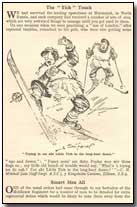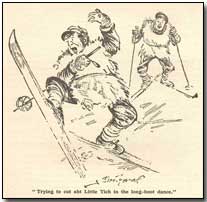Memoirs & Diaries - The Best 500 Cockney War Stories - The "Tich" Touch and Other Stories
 Published in London
in 1921, The Best 500 Cockney War Stories
comprised, in the words of its newspaper publisher (The London Evening
News) "a remembering and retelling of those war days when laughter
sometimes saved men's reason".
Published in London
in 1921, The Best 500 Cockney War Stories
comprised, in the words of its newspaper publisher (The London Evening
News) "a remembering and retelling of those war days when laughter
sometimes saved men's reason".
The collection of short memoirs, some 500 in total, is divided into five categories - Action, Lull, Hospital, High Seas and Here and There. This page contains five stories from Lull, led by The "Tich" Touch.
Other sections within the collection can be accessed using the sidebar to the right.
The "Tich" Touch
We had survived the landing operations at Murmansk, in North Russia, and each company had received a number of sets of skis, which are very awkward things to manage until you get used to them.
On one occasion when we were practising, a "son of London," after repeated tumbles, remarked to his pals, who were also getting some "ups and downs": "Fancy seein' me dahn Poplar way wiv these fings on; my little old bunch of trouble would say, 'What's 'e trying ter do nah? Cut aht Little Tich in the long-boot dance?'"
C. H. Mitchell (late Staff-Sergt. A.S.C.), 7 Kingsholm Gardens, Eltham, S.E.9
Smart Men All
One of the usual orders had come through to my battalion of the Middlesex Regiment for a number of men to be detailed for extra regimental duties which would be likely to take them away from the battalion for a considerable time. The company I commanded had to provide twenty men.
It was a golden opportunity to make a selection of those men whose physical infirmities were more evident than the stoutness of their hearts.
Together with my company sergeant-major I compiled a list of those who could best be spared from the trenches, and the following day they were paraded for inspection before moving off.
As I approached, one of the men who had been summing up his comrades and evidently realised the reason for their selection, remarked in a very audible Cockney whisper, "What I says is, if you was to search the 'ole of Norvern France you wouldn't find a smarter body o' men!"
"Nobby" (late Captain, Middlesex Regiment), Potters Bar, Middlesex
"You'd Pay a Tanner at the Zoo!"
During the floods in Palestine in 1917 I had to be sent down the line with an attack of malaria.
Owing to the roads being deep in water, I was strapped in an iron chair pannier on the back of a camel. My sick companion, who balanced me on the other side of the camel, was a member of the London Regiment affectionately known as the Hackney Gurkhas.
The Johnnie patiently trudged through the water leading the camel, and kept up the cry of "Ish Ish!" as it almost slipped down at every step.
I was feeling pretty bad with the swaying, and said to my companion, "Isn't this the limit?"
"Shurrup, mate!" he replied. "Yer don't know when yer well orf: You'd 'ave to pay a tanner for this at the Zoo!"
Frederick T. Fitch (late 1/5th Batt. Norfolk Regt.), The Gordon Boys' Home, West End, Woking, Surrey
Smoking Without Cigarettes
Most ex-soldiers will remember the dreary monotony of "going through the motions" of every movement in rifle exercises.
We had just evacuated our position on the night of December 4-5, 1917, at Cambrai, after the German counter-attack, and, after withstanding several days' severe battering both by the enemy and the elements, were staggering along, tired and frozen and hungry, and generally fed up.
When we were deemed to be sufficiently far from the danger zone the order was given to allow the men to smoke. As practically everyone in the battalion had been without cigarettes or tobacco for some days the permission seemed to be wasted.
But I passed the word down, "'C' Company, the men may smoke," to be immediately taken up by a North Londoner: "Yus, and if you ain't got no fags you can go through the motions."
H. H. Morris, M.C. (late Lieut., 16th Middlesex Regt.), 10 Herbert Street, Malden Road, N.W.5
An Expensive Light
Winter 1915, at Wieltje, on the St. Jean Road. We were on post in a shell-hole in No Man's Land, and the night was black.
Without any warning, my Cockney pal Nobby threw a bomb towards the German trench, and immediately Fritz sent up dozens of Verey lights. I turned anxiously to Nobby and asked, "What is it? Did you spot anything?" and was astonished when he replied, "I wanted ter know the time, and I couldn't see me blinkin' watch in the dark."
E. W. Fellows, M.M. (late 6th Battn. D.C.L.I.), 33 Dunlace Road, Clapton, E.5
Next - Modern Conveniences and four other stories
3 British Officers were executed by courts martial during the war, as opposed to 316 Private soldiers and 24 Non-Commissioned Officers. The vast majority were for desertions.
- Did you know?

